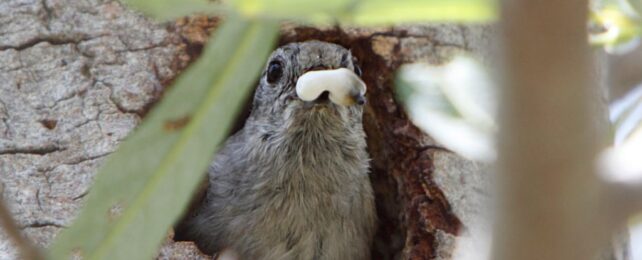Birds are some of the most well-researched animals in the world, and yet biologists have missed studying one of their favorite foods for too long.
Feces.
That's right, a wide range of birds actually like to chow down on the sticky stuff, and it could have a profound and overlooked impact on their health. In fact, their penchant for poop could be a crucial reason for the resilience of birds across continents and millions of years.
Eating feces is a behavior well-documented in insects, mammals, and some domestic birds, like parrots, but research in wild avians is still in its infancy.
In a recently published paper, a team of researchers, led by environmental microbiologist Alice Dunbar from the University of South Australia, has laid out what we know so far about "this poorly understood behavior", and what benefits it could possibly provide.
In the past twenty years or so, scientists around the world have caught species of ostrich, ptarmigan, duck, crossbill, petrel, vulture, magpie, and moorhen with their toes in the poop jar – so to speak.
Some of these birds feast on feces from their own species, while others prefer the taste of more exotic excrement, like dog poop, whale poop, river otter poop, puma poop, cow poop, seal poop, and poop from other birds.
Poop is everywhere, and apparently, birds make the most of that.
As the researchers suggest, swallowing droppings may help rebalance good bacteria in avian guts, similar to how fecal transplants work in humans.
The common ostrich, for instance, feeds its young its own excrement, and a 2023 study found that the gut microbiome of hatchlings matures faster when they have access to fresh fecal matter.
Nor is poop just a delicacy for the young. In recent years, adult bulbuls, robins, drongos, mockingbirds, Florida scrub jays, and American crows have all been observed tucking into the feces of their own offspring.
When the parent bird delivers food to their nestlings, they get a tasty little snack in return for all their hard work.
@tednewy Nature's Recycling: the poop of the baby bird was eaten by the mother bird. #Sooty-headed Bulbul #BabyBird #BirdFeeding #ParentalDedication #FeedingCycle #NutritionCircle #NaturesEfficiency #WasteNotWantNot #NestlingDiet #FoodChainSecrets #SustainableParenting ♬ suara asli - Tednew
Like a Pez dispenser, their young will turn around and pop out a 'fecal sac' from their anus, which the parent then grabs and swallows, as easy as taking candy from a baby. The sac looks like a little dumpling, and it essentially functions like a diaper for chicks that can't yet leave the nest. Yum.
@tednewy when one of these baby birds defecates, they point their anus toward the parent so that the parent can grab it from behind to eat, or be flown out to keep the nest clean. When baby birds are very young, their digestive systems are too weak to digest much of what they eat. So their feces store a lot of undigested nutrients. In essence, by defecating, they make a healthy snack for their mother. However, as baby birds get older, the bacteria in their guts get stronger, so the parents stop eating their chicks' feces. #babyrobins #birdnest #birdfeeding #babybird #nest #birdlife #birdvideography #birdwatching #nature #birdwildlife #birdnature #wildlife #birdoftiktok #birdslove #birdlover #birds #bird #duniaburung #pecintaburung #burung ♬ suara asli - Tednew
The remarkable behavior is woefully understudied. Scientists think it could help keep the nest clean, or it could also be a way for the adult bird to retain nutrients and microbes that it might have lost from the hard work of parenting.
In a 2020 study on the giant babax, the fecal sacs of hatchlings were found to have a high abundance of Firmicutes bacteria – which is a key feature of the gut in many bird species.
Apart from maintaining gut health, eating dung could also help birds adapt to a lack of available nutrients. White-winged crossbills, for instance, are thought to feed on river otter poop because it contains undigested bones made of calcium. Whereas giant petrels are thought to eat seal poop because it's high energy food source, one that's readily available after extended periods of fasting while keeping eggs warm on the nest.
But all of these are just ideas. We'll only know for sure why birds eat poop if scientists start studying it.
"Detailed investigations to tease apart the potential benefits of [eating feces] in the context of different life stages, with varying resource demands and resource availability, are sorely needed," the researchers conclude.
The study was published in Biological Reviews.
